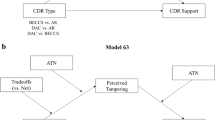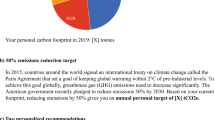Abstract
Global warming is caused mainly by CO2 emission from burning fossil fuels and is beginning to have large negative impacts on human well-being and ecosystems (IPCC 2014; IPCC 2018). Policies that mitigate CO2 emissions will require public support. Here, we examine how support for several possible decarbonization policies varies as a function of the personal carbon footprint of a researcher who advocates the policy. We find that people are more likely to support policies if the advocate for these policies has a low carbon footprint. Replicating our prior work, we find that the communicators’ carbon footprint massively affect their credibility and intentions of their audience to conserve energy (Attari, Krantz and Weber 2016). Our new finding is that their carbon footprint also affects audience support for public policies advocated by the communicator. In a second study, we show that the negative effects of a large carbon footprint on credibility are greatly reduced if the communicator reforms their behavior by reducing their personal carbon footprints. The implications of these results are stark: effective communication of climate science and advocacy of both individual behavior change and public policy interventions are greatly helped when advocates lead the way by reducing their own carbon footprint.



Similar content being viewed by others
Notes
In Attari et al. (2016), α was around .87 for the 15 vignettes without high home energy use but only about .76 for the 3 high home energy vignettes.
The three behavioral intentions are analyzed in separate logistic regressions. These three dichotomous responses were part of a set of seven yes/no items, presented together in one section of the survey. The multivariate structure of these seven responses was analyzed in Attari et al. (2016) but does not add much of interest beyond modest intercorrelation of the intentions.
see, e.g.: http://noflyclimatesci.org/
References
Attari SZ, Krantz DH, Weber EU (2016) Statements about climate researchers’ carbon footprints affect their credibility and the impact of their advice. Clim Chang 138:325–338
Carvalho A, van Wessel M, Maeseele P (2017) Communication practices and political engagement with climate change: a research agenda. Environ Commun 11:122–135
Chapman L (2007) Transport and climate change: a review. J Transp Geogr 15:354–367
Clayton S, Devine-Wright P, Stern PC, Whitmarsh L, Carrico A, Steg L, Swim J, Bonnes M (2015) Psychological research and global climate change. Nat Clim Chang 5:640
Dietz T, Gardner G, Gilligan J, Stern PC, Vandenbergh M (2009) Household actions can provide a behavioral wedge to rapidly reduce US carbon emissions. Proc Natl Acad Sci 106:18452–18456
Gallup (2017) U.S. Conservatives outnumber liberals by narrowing margin
Gardner G, Stern P (2008) The short list: the most effective actions U.S. households can take to curb climate change. Environ Magazine 50:12–24
Geels FW, Sovacool BK, Schwanen T, Sorrell S (2017) Sociotechnical transitions for deep decarbonization. Science 357:1242–1244
Hansen J, Johnson D, Lacis A, Lebedeff S, Lee P, Rind D, Russell G (1981) Climate impact of increasing atmospheric carbon dioxide. Science 213:957
Holdren JP, Ehrlich PR (1974) Human population and the global environment: population growth, rising per capita material consumption, and disruptive technologies have made civilization a global ecological force. Am Sci 62:282–292
Hovland, C. I., I. L. Janis & H. H. Kelley (1953) Communication and persuasion; psychological studies of opinion change
IPCC (2014) Climate change 2007: impacts, adaptation and vulnerability. In Contribution of Working Group II to the Fourth Assessment Report of the Intergovernmental Panel on Climate Change
IPCC (2018) Global warming of 1.5C - summary for policymakers. In Intergovernmental Panel on Climate Change
Kalmus P (2017) Being the change: live well and spark a climate revolution
Kotcher JE, Myers TA, Vraga EK, Stenhouse N, Maibach EW (2017) Does engagement in advocacy hurt the credibility of scientists? Results from a randomized national survey experiment. Environ Commun 11:415–429
Kraft-Todd GT, Bollinger B, Gillingham K, Lamp S, Rand DG (2018) Credibility-enhancing displays promote the provision of non-normative public goods. Nature 563:245–248
Le Quéré, C., S. Capstick, A. Corner, D. Cutting, M. Johnson, A. Minns, H. Schroeder, K. Walker-Springett, L. Whitmarsh & R. Wood (2015) Towards a culture of low-carbon research for the 21 st century
Leiserowitz AA, Maibach EW, Roser-Renouf C, Smith N, Dawson E (2013) Climategate, public opinion, and the loss of trust. Am Behav Sci 57:818–837
Levine AS, Kline R (2017) A new approach for evaluating climate change communication. Clim Chang 142:301–309
Maibach EW, Roser-Renouf C, Leiserowitz A (2008) Communication and marketing as climate change–intervention assets: a public health perspective. Am J Prev Med 35:488–500
Nordhaus WD (2007) To tax or not to tax: alternative approaches to slowing global warming. Rev Environ Econ Policy 1:26–44
Ockwell D, Whitmarsh L, O'Neill S (2009) Reorienting climate change communication for effective mitigation: forcing people to be green or fostering grass-roots engagement? Sci Commun 30:305–327
Pidgeon N, Fischhoff B (2011) The role of social and decision sciences in communicating uncertain climate risks. Nat Clim Chang 1:35–41
Pidgeon N, Demski C, Butler C, Parkhill K, Spence A (2014) Creating a national citizen engagement process for energy policy. Proc Natl Acad Sci 111:13606–13613
Scheufele DA (2014) Science communication as political communication. Proc Natl Acad Sci 111:13585–13592
Walton DN (1987) The ad hominem argument as an informal fallacy. Argumentation 1:317–331
Wynes S, Nicholas KA (2017) The climate mitigation gap: education and government recommendations miss the most effective individual actions. Environ Res Lett 12:074024
Funding
Funding for this project was provided by the National Science Foundation (SES–0951516) and the O’Neill School of Public and Environmental Affairs at Indiana University Bloomington. We thank Steven Bakovic and Andrew Barnes for research support.
Author information
Authors and Affiliations
Contributions
S.Z.A. and D.H.K. designed research; S.Z.A. collected the data; S.Z.A. and D.H.K. analyzed data; and S.Z.A., D.H.K., and E.U.W. wrote the paper.
Corresponding author
Ethics declarations
This research was approved by Indiana University’s Internal Review Board at the Office of Research Administration, and informed consent was received from all participants.
Conflict of interest
The authors declare that they have no conflict of interest.
Additional information
Publisher’s note
Springer Nature remains neutral with regard to jurisdictional claims in published maps and institutional affiliations.
Electronic supplementary material
ESM 1
(DOCX 214 kb)
Rights and permissions
About this article
Cite this article
Attari, S.Z., Krantz, D.H. & Weber, E.U. Climate change communicators’ carbon footprints affect their audience’s policy support. Climatic Change 154, 529–545 (2019). https://doi.org/10.1007/s10584-019-02463-0
Received:
Accepted:
Published:
Issue Date:
DOI: https://doi.org/10.1007/s10584-019-02463-0




